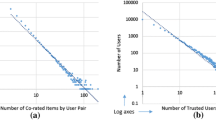Abstract
Trust relationships between users in various online communities are notoriously hard to model for computer scientists. It can be easily verified that trying to infer trust based on the social network alone is often inefficient. Therefore, the avenue we explore is applying Data Mining algorithms to unearth latent relationships and patterns from background data. In this paper, we focus on a case where the background data are user ratings for online product reviews. We consider as a testing ground a large dataset provided by Epinions.com that contains a trust network as well as user ratings for reviews on products from a wide range of categories. In order to predict trust we define and compute a critical set of features, which we show to be highly effective in providing the basis for trust predictions. Then, we show that state-of-the-art classifiers can do an impressive job in predicting trust based on our extracted features. For this, we employ a variety of measures to evaluate the classification based on these features. We show that by carefully collecting and synthesizing readily available background information, such as ratings for online reviews, one can accurately predict social links based on trust.





Similar content being viewed by others
Notes
The features of ant8 were computed with μ = 5 and α = 0.1.
References
Bhattacharyya P, Garg A, Wu SF (2011) Analysis of user keyword similarity in online social networks. Soc Netw Anal Min 1(3):143–158
Borzymek P, Sydow M, Wierzbicki A (2009) Enriching trust prediction model in social network with user rating similarity. In: CASoN, pp 40–47
Chen L, Qi L (2011) Social opinion mining for supporting buyers’ complex decision making: exploratory user study and algorithm comparison. Soc Netw Anal Min 1(4):301–320
Chowdhury M, Thomo A, Wadge WW (2009) Trust-based infinitesimals for enhanced collaborative filtering. In: COMAD
Ebrahimi S, Villegas NM, Müller HA, Thomo A (2012) Smarterdeals: a context-aware deal recommendation system based on the smarter context engine. In: Jacobsen HA, Zou Y, Chen J (eds) CASCON, IBM/ACM, pp 116–130
Ferri F, Grifoni P, Guzzo T (2012) New forms of social and professional digital relationships: the case of facebook. Soc Netw Anal Min 2(2):121–137
Golbeck J (2005) Computing and applying trust in web-based social networks. PhD thesis)
Guha RV, Kumar R, Raghavan P, Tomkins A (2004) Propagation of trust and distrust. In: WWW, pp 403–412
Hall M, Frank E, Holmes G, Pfahringer B, Reutemann P, Witten IH (2009) The WEKA data mining software: an update. SIGKDD Explor Newsl 11(1):10–18
Jamali M, Ester M (2009) TrustWalker: a random walk model for combining trust-based and item-based recommendation. In: KDD, pp 397–406
Khezrzadeh M, Thomo A, Wadge WW (2009) Harnessing the power of "favorites" lists for recommendation systems. In: Bergman LD, Tuzhilin A, Burke RD, Felfernig A, Schmidt-Thieme L (eds) RecSys, ACM, pp 289–292
Koren Y (2010) Collaborative filtering with temporal dynamics. Commun ACM 53:89–97
Kuter U, Golbeck J (2007) Sunny: a new algorithm for trust inference in social networks using probabilistic confidence models. In: AAAI’07, pp 1377–1382
Liu H, Lim EP, Lauw HW, Le MT, Sun A, Srivastava J, Kim YA (2008) Predicting trusts among users of online communities: an epinions case study. In: ACM conference on electronic commerce, pp 310–319
Ma N, Lim EP, Nguyen VA, Sun A, Liu H (2009) Trust relationship prediction using online product review data. In: CIKM-CNIKM, pp 47–54
Massa P, Avesani P (2005) Controversial users demand local trust metrics: An experimental study on epinions.com community. In: AAAI, pp 121–126
Massa P, Avesani P (2009) Trust metrics in recommender systems. In: Computing with social trust, pp 259–285
Nguyen VA, Lim EP, Jiang J, Sun A (2009) To trust or not to trust? predicting online trusts using trust antecedent framework. In: ICDM, pp 896 –901
Noor TH, Sheng QZ (2011) Credibility-based trust management for services in cloud environments. In: ICSOC, pp 328–343
Rajagopalan K, Venkatesh S, Thomo A (2012) Learning the news in social networks. In: Lukasiewicz T, Sali A (eds) FoIKS, Springer, Lecture Notes in Computer Science, vol 7153, pp 298–311
Sherchan W, Nepal S, Bouguettaya A (2011) A trust prediction model for service web. In: TrustCom, pp 258–265
Sinclaire J, Simon J, Wilkes R (2010) A prediction model for initial trust formation in electronic commerce. In: International Business Research, pp 17–27
Skopik F, Schall D, Dustdar S (2009) Start trusting strangers? bootstrapping and prediction of trust. In: WISE, pp 275–289
Author information
Authors and Affiliations
Corresponding author
Rights and permissions
About this article
Cite this article
Korovaiko, N., Thomo, A. Trust prediction from user-item ratings. Soc. Netw. Anal. Min. 3, 749–759 (2013). https://doi.org/10.1007/s13278-013-0122-z
Received:
Accepted:
Published:
Issue Date:
DOI: https://doi.org/10.1007/s13278-013-0122-z




